最新高中英语必修四知识点归纳
高中英语必修四知识点归纳大全
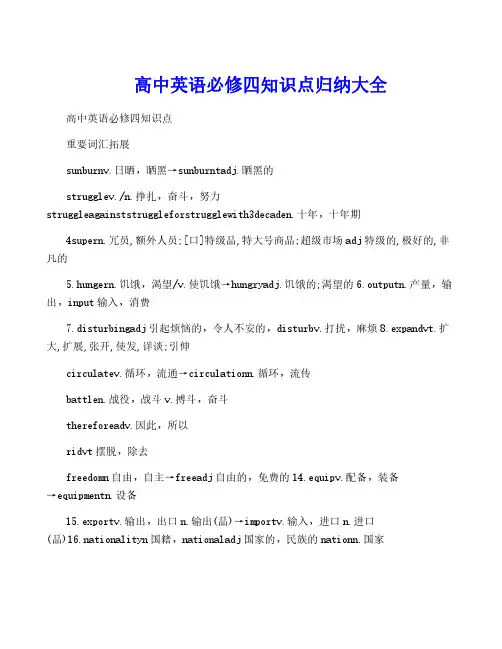
高中英语必修四知识点归纳大全高中英语必修四知识点重要词汇拓展sunburnv.日晒,晒黑→sunburntadj.晒黑的strugglev./n.挣扎,奋斗,努力struggleagainststruggleforstrugglewith3decaden.十年,十年期4supern.冗员,额外人员;[口]特级品,特大号商品;超级市场adj特级的,极好的,非凡的5.hungern.饥饿,渴望/v.使饥饿→hungryadj.饥饿的;渴望的6.outputn.产量,输出,input输入,消费7.disturbingadj引起烦恼的,令人不安的,disturbv.打扰,麻烦8.expandvt.扩大,扩展,张开,使发,详谈;引伸circulatev.循环,流通→circulationn.循环,流传battlen.战役,战斗v.搏斗,奋斗thereforeadv.因此,所以ridvt摆脱,除去freedomn自由,自主→freeadj自由的,免费的14.equipv.配备,装备→equipmentn.设备15.exportv.输出,出口n.输出(品)→importv.输入,进口n.进口(品)16.nationalityn国籍,nationaladj国家的,民族的nationn.国家17.occupationn工作,职业,占领occupyv.占用,使从事,把注意力集中于...占领,占据18.confusev.使迷惑,使为难→confusedadj.感到迷惑的confusingadj.令人迷惑的19regretv./n.后悔,遗憾→regretfuladj.后悔的,遗憾的20.productionn.生产,制造,productive可生产的,可制造的,produce–v生产,制造21.discoveryn.发现,发觉,discover-v发现,focusv.集中,聚焦,n焦点,中心点reducev.减少,缩减→reductionn.减少,缩减返回目录高中英语知识点梳理重点梳理1ifnot如果不….Ifso如果这样,2.consideroneselfsth自认为是…considersbsth认为某人是…3.sincethen从那时起4.searchforawaytodosth寻找做某事的途径。
高中英语必修四知识点归纳
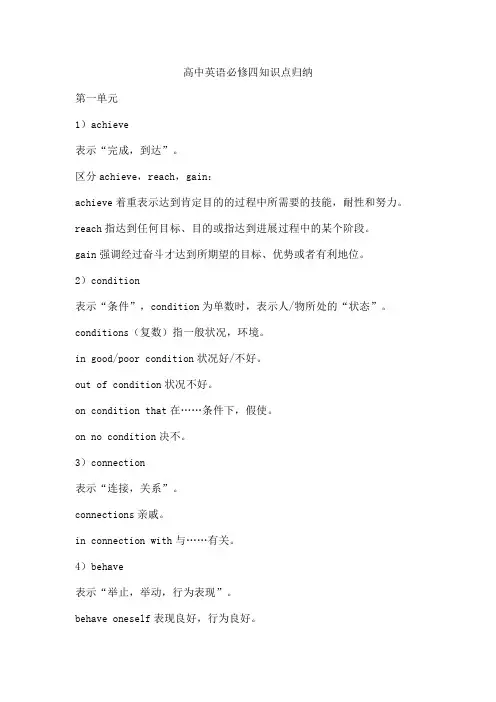
高中英语必修四知识点归纳第一单元1)achieve表示“完成,到达”。
区分achieve,reach,gain:achieve着重表示达到肯定目的的过程中所需要的技能,耐性和努力。
reach指达到任何目标、目的或指达到进展过程中的某个阶段。
gain强调经过奋斗才达到所期望的目标、优势或者有利地位。
2)condition表示“条件”,condition为单数时,表示人/物所处的“状态”。
conditions(复数)指一般状况,环境。
in good/poor condition状况好/不好。
out of condition状况不好。
on condition that在……条件下,假使。
on no condition决不。
3)connection表示“连接,关系”。
connections亲戚。
in connection with与……有关。
4)behave表示“举止,举动,行为表现”。
behave oneself表现良好,行为良好。
behave as起……作用,表现为……。
5)worthwhile表示“值得做的,值得出力的”。
句型it is worhtwhile doing/to do sth“干……是值得的”。
6)observe表示“观看,留意”,可接省略to的不定式的复合结构,当observe用被动语态时,其后的不定式应回复to。
observe后也可接由现在分词构成的复合结构。
后接that从句,表示“留意到,说”。
observe还可以表示“遵守,庆祝”。
7)respect作动词,后直接跟宾语。
respect oneself自重,自尊。
作名词,表示“敬重,敬重”。
have/show respect for意为“对……敬重/敬重”。
have respect to留意,考虑。
表示“敬意,问候”时,用复数形式,常与give,send,pay连用。
in respect of sth就某方面而言。
with respect to 涉及,关于。
高中英语必修四知识点归纳
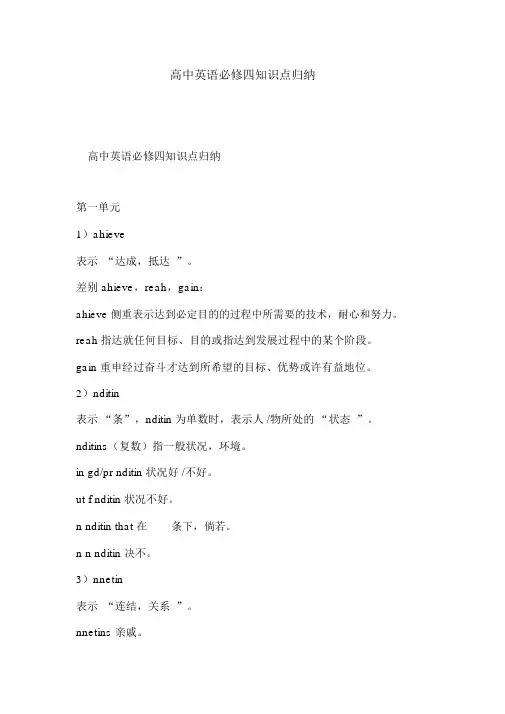
高中英语必修四知识点归纳高中英语必修四知识点归纳第一单元1)ahieve表示“达成,抵达”。
差别 ahieve,reah,gain:ahieve 侧重表示达到必定目的的过程中所需要的技术,耐心和努力。
reah指达就任何目标、目的或指达到发展过程中的某个阶段。
gain 重申经过奋斗才达到所希望的目标、优势或许有益地位。
2)nditin表示“条”,nditin 为单数时,表示人 /物所处的“状态”。
nditins(复数)指一般状况,环境。
in gd/pr nditin 状况好 /不好。
ut f nditin 状况不好。
n nditin that 在条下,倘若。
n n nditin 决不。
3)nnetin表示“连结,关系”。
nnetins 亲戚。
in nnetin ith 与相关。
4)behave表示“举止,行为,行为表现”。
behave neself表现优秀,行为优秀。
behave as起作用,表现为。
)r thhile表示“值得做的,值得卖力的”。
句型 It is rhthile ding/t d sth“干是值得的”。
6)bserve表示“察看,注意”,可接省略 t 的不定式的复合构造,当 bserve用被动语态时,后来的不定式应答复 t。
bserve后也可接由此刻分词组成的复合构造。
后接 that 从句,表示“注意到,说”。
bserve还能够表示“恪守,庆贺”。
7)respet作动词,后直接跟宾语。
respet neself自重,自尊。
作名词,表示“尊敬,敬爱”。
have/sh respet fr意为“对尊敬/敬爱”。
have respet t注意,考虑。
表示“敬意,问候”时,用复数形式,常与give,send,pa 连用。
in respet f sth就某方面而言。
ith respet t 波及,对于。
8)argue表示“争辩,争辩”。
argue ith sb(abut/fr)(为/对于)和某人争辩。
新教材人教版高中英语选择性必修第四册全册重点单词短语句型汇总(47页)
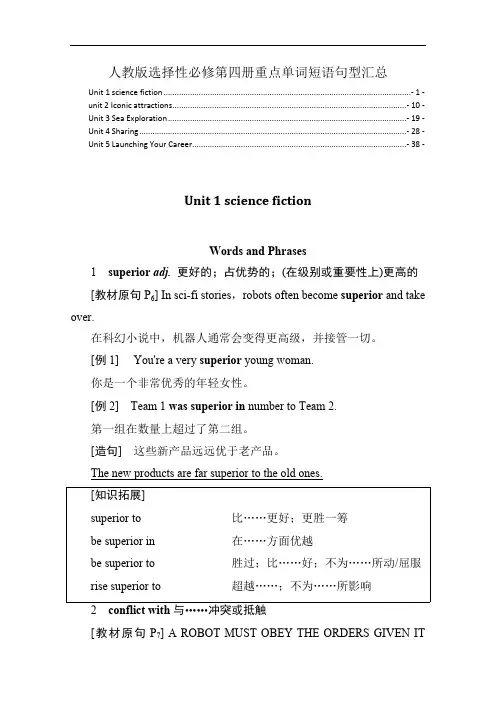
人教版选择性必修第四册重点单词短语句型汇总Unit 1 science fiction................................................................................................................- 1 -unit 2 Iconic attractions..........................................................................................................- 10 -Unit 3 Sea Exploration............................................................................................................- 19 -Unit 4 Sharing.........................................................................................................................- 28 -Unit 5 Launching Your Career.................................................................................................- 38 -Unit 1 science fictionWords and Phrases1 superior adj.更好的;占优势的;(在级别或重要性上)更高的[教材原句P6] In scifi stories,robots often become superior and take over.在科幻小说中,机器人通常会变得更高级,并接管一切。
高中英语必修四重点单词表
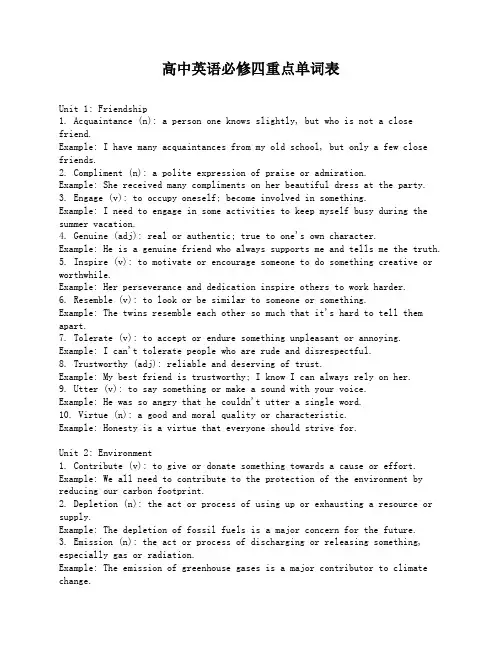
高中英语必修四重点单词表Unit 1: Friendship1. Acquaintance (n): a person one knows slightly, but who is not a close friend.Example: I have many acquaintances from my old school, but only a few close friends.2. Compliment (n): a polite expression of praise or admiration.Example: She received many compliments on her beautiful dress at the party. 3. Engage (v): to occupy oneself; become involved in something.Example: I need to engage in some activities to keep myself busy during the summer vacation.4. Genuine (adj): real or authentic; true to one's own character.Example: He is a genuine friend who always supports me and tells me the truth.5. Inspire (v): to motivate or encourage someone to do something creative or worthwhile.Example: Her perseverance and dedication inspire others to work harder.6. Resemble (v): to look or be similar to someone or something.Example: The twins resemble each other so much that it's hard to tell them apart.7. Tolerate (v): to accept or endure something unpleasant or annoying. Example: I can't tolerate people who are rude and disrespectful.8. Trustworthy (adj): reliable and deserving of trust.Example: My best friend is trustworthy; I know I can always rely on her.9. Utter (v): to say something or make a sound with your voice.Example: He was so angry that he couldn't utter a single word.10. Virtue (n): a good and moral quality or characteristic.Example: Honesty is a virtue that everyone should strive for.Unit 2: Environment1. Contribute (v): to give or donate something towards a cause or effort. Example: We all need to contribute to the protection of the environment by reducing our carbon footprint.2. Depletion (n): the act or process of using up or exhausting a resource or supply.Example: The depletion of fossil fuels is a major concern for the future.3. Emission (n): the act or process of discharging or releasing something, especially gas or radiation.Example: The emission of greenhouse gases is a major contributor to climate change.4. Extinction (n): the act or process of dying out or becoming extinct. Example: Many species are at risk of extinction due to deforestation.5. Inevitable (adj): certain to happen; unavoidable.Example: The consequences of our actions are inevitable; we need to take responsibility for them.6. Preserve (v): to keep or maintain something in its original or existing state.Example: We need to preserve our natural resources for future generations.7. Promote (v): to support or encourage the growth or development of something. Example: The government should promote renewable energy sources to reduce carbon emissions.8. Recycle (v): to convert waste into reusable material.Example: We should recycle paper, plastic, and glass to reduce waste.9. Sustainable (adj): able to be maintained or continued over the long term. Example: Switching to renewable energy sources is crucial for creating a sustainable future.10. Wildlife (n): animals and plants that live in their natural environment, not domesticated or cultivated.Example: The destruction of wildlife habitats is a major threat to biodiversity.Unit 3: A Healthy Life1. Adequate (adj): enough or satisfactory in quantity or quality.Example: It's important to get adequate sleep for good health.2. Alleviate (v): to make something less severe or more bearable.Example: Drinking herbal tea can help alleviate a sore throat.3. Cope (v): to deal effectively with something difficult or challenging. Example: It can be difficult to cope with stress, but meditation and exercise can help.4. Diagnose (v): to identify or determine the nature of a disease or medical condition.Example: The doctor will need to run some tests to diagnose your illness.5. Epidemic (n): a widespread occurrence of a disease in a community or population at a particular time.Example: The flu epidemic resulted in many people falling ill.6. Infectious (adj): capable of being transmitted from one person to another. Example: Cold and flu viruses are highly infectious and can spread rapidly.7. Nutrition (n): the process of providing or obtaining the food necessary for health and growth.Example: A balanced diet is essential for good nutrition.8. Obesity (n): a medical condition characterized by an excess of body fat.Example: Childhood obesity has become a major concern in many countries.9. Recovery (n): the process of regaining health or strength after an illness or injury.Example: With proper treatment, her recovery from surgery was swift.10. Therapy (n): treatment intended to relieve or heal a disorder or illness. Example: Physical therapy can help with the recovery of muscle injuries.Unit 4: Literature and Art1. Appreciate (v): to recognize the value or importance of something; toadmire or enjoy something.Example: I appreciate classical literature for its timeless themes andbeautiful language.2. Capture (v): to catch or seize something, often in a photograph or painting. Example: The artist's painting captured the beauty of the sunset perfectly.3. Display (v): to show or exhibit something for others to see.Example: The museum displays a wide range of historical artifacts.4. Drama (n): a genre of literature or performance characterized by conflict and emotion.Example: Shakespeare's plays are known for their drama and tragic themes.5. Imagery (n): the use of vivid or descriptive language to create mental images.Example: The poet's use of imagery painted a picture in my mind.6. Sculpture (n): a three-dimensional work of art created by carving, modeling, or molding materials.Example: The sculpture in the park was made from bronze and symbolized peace.7. Symbol (n): an object, person, or idea that represents or stands for something else.Example: The dove is a symbol of peace and freedom.8. Theme (n): the main idea or underlying message in a literary or artistic work.Example: The theme of love and sacrifice is prevalent in many classic novels.9. Verse (n): a line of poetry or a metrical composition.Example: He recited a beautiful verse from his favorite poem.10. Visual (adj): relating to or involving seeing or sight.Example: The graphic designer created a visually stunning website.Unit 5: Cultural Identity1. Adapt (v): to adjust or modify oneself to fit new circumstances or conditions.Example: When moving to a new country, it's important to adapt to the local customs and traditions.2. Ancestor (n): a person who is related to you and lived in the past. Example: My ancestors emigrated from Ireland during the potato famine.3. Assimilate (v): to absorb or integrate into a larger community or culture. Example: Immigrants often need to assimilate into their new society while maintaining their cultural identity.4. Custom (n): a traditional way of behaving or doing something that isspecific to a particular society or group.Example: It's a custom in our family to exchange gifts on Christmas Eve.5. Heritage (n): the legacy or inheritance of cultural traditions and customs. Example: I am proud of my Chinese heritage and celebrate traditional festivals with my family.6. Origin (n): the point or place from which something begins or arises. Example: The origin of the custom of exchanging wedding rings dates back to ancient Egypt.7. Ritual (n): a religious or solemn ceremony consisting of a series ofactions performed in a set order.Example: The bride and groom conducted traditional marriage rituals to symbolize their union.8. Symbolize (v): to represent or stand for something through the use of symbols.Example: The color red in Chinese culture symbolizes luck and happiness.9. Tradition (n): a belief, custom, or practice that is handed down from generation to generation.Example: It's a tradition in our family to have a big reunion dinner during Chinese New Year.10. Values (n): principles or beliefs that are considered important or desirable in a culture.Example: Honesty and respect for others are important values in many societies.Unit 6: Health and Wellness1. Balance (v): to manage successfully the different aspects of one's life, such as work, family, and personal interests.Example: Maintaining a healthy work-life balance is essential for overallwell-being.2. Diet (n): the food that a person or organism habitually eats.Example: A balanced diet includes a variety of fruits, vegetables, whole grains, and lean proteins.3. Exercise (v): to engage in physical activity to maintain fitness, health,or pleasure.Example: Regular exercise can improve cardiovascular health and boost mood.4. Habit (n): an established way of behaving; a regular pattern of behavior.Example: Developing healthy habits, such as drinking plenty of water andgetting enough sleep, can lead to a better quality of life.5. Lifestyle (n): the way a person lives, including their habits, activities, and choices.Example: An unhealthy lifestyle can increase the risk of developing chronic diseases.6. Meditation (n): a practice in which a person focuses their attention to achieve a state of relaxation, clarity, and concentration.Example: Meditation can help reduce stress and improve mental well-being.7. Mental (adj): relating to the mind or mental processes.Example: Mental health is crucial for overall health and wellness.8. Nutrition (n): the nourishment required by the body to maintain health, energy, and growth.Example: Good nutrition is important for the proper development andfunctioning of the body.9. Relax (v): to become calm and peaceful; to reduce tension and stress. Example: Engaging in activities like yoga or reading can help relax the mind and body.10. Well-being (n): the state of being healthy, happy, and prosperous. Example: Pursuing activities that promote well-being, such as spending time with loved ones or pursuing hobbies, can enhance one's overall quality of life. Unit 7: Science and Technology1. Invention (n): the creation of a new device or method by inventive talent. Example: The invention of the internet has revolutionized the way we communicate and access information.2. Innovation (n): the act or process of introducing new ideas, devices, or methods.Example: Technological innovation has led to advancements in medicaltreatments and procedures.3. Experiment (n): a procedure or activity carried out to support, refute, or validate a hypothesis.Example: Scientists conduct experiments to test their theories and gain abetter understanding of the natural world.4. Theory (n): a proposed explanation for a phenomenon, especially one that is supported by scientific evidence.Example: The theory of evolution explains how species change over time through the process of natural selection.5. Discovery (n): the act of finding something unknown or the thing found. Example: The discovery of penicillin by Alexander Fleming revolutionized the field of medicine.6. Evidence (n): information that makes it likely that a theory or claim is true.Example: Fossil records provide evidence of the existence of extinct species.7. Research (n): the systematic investigation of a subject or the methodical study of materials and sources to establish facts and reach new conclusions. Example: Medical researchers study diseases to find better treatments and cures.8. Scientist (n): a person who is qualified or engaged in a scientific field of study.Example: A chemist is a scientist who studies the properties and composition of substances.9. Technology (n): the application of scientific knowledge for practical purposes, especially in industry and engineering.Example: Modern technology has allowed for advancements in communication and transportation.10. Theory (n): a set of principles or ideas intended to explain how something works or why something happens.Example: The Big Bang theory explains the origin and evolution of the universe.。
英语高中人教版必修4知识点总结
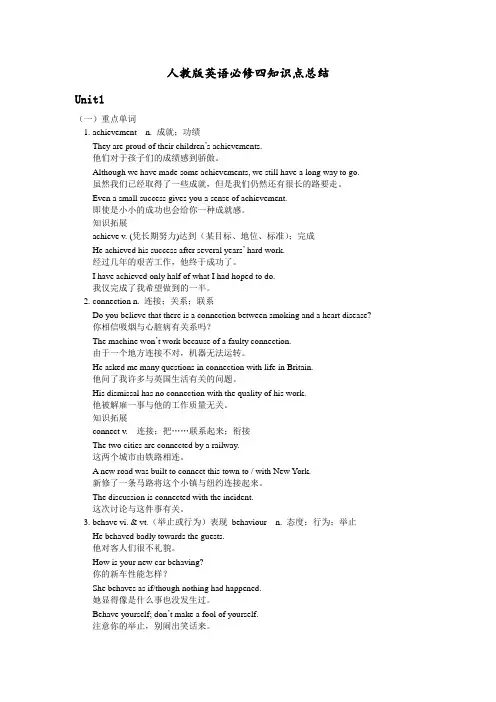
人教版英语必修四知识点总结Unit1(一)重点单词1. achievement n. 成就;功绩They are proud of their children’s achievements.他们对于孩子们的成绩感到骄傲。
Although we have made some achievements, we still have a long way to go.虽然我们已经取得了一些成就,但是我们仍然还有很长的路要走。
Even a small success gives you a sense of achievement.即使是小小的成功也会给你一种成就感。
知识拓展achieve v. (凭长期努力)达到(某目标、地位、标准);完成He achieved his success after several years’ hard work.经过几年的艰苦工作,他终于成功了。
I have achieved only half of what I had hoped to do.我仅完成了我希望做到的一半。
2. connection n. 连接;关系;联系Do you believe that there is a connection between smoking and a heart disease?你相信吸烟与心脏病有关系吗?The machine won’t work because of a faulty connection.由于一个地方连接不对,机器无法运转。
He asked me many questions in connection with life in Britain.他问了我许多与英国生活有关的问题。
His dismissal has no connection with the quality of his work.他被解雇一事与他的工作质量无关。
知识拓展connect v. 连接;把……联系起来;衔接The two cities are connected by a railway.这两个城市由铁路相连。
高中英语必修四Unit4重点总结
高中英语必修四Unit4重点总结本文档对高中英语必修四Unit4进行重点总结,主要包括以下内容:1. The Speaker's Background 说话者的背景本单元的内容主要关注两个不同背景的人物:Jin Jing和Li Wei。
Jin Jing是一位知名的中国残奥会举重冠军,她在比赛中取得了优异的成绩。
作为一位身体残疾人,Jin Jing以她坚韧不拔的精神和毅力激励着许多人。
Li Wei是一位普通的中国中学生,他对Jin Jing非常崇拜并受到她的影响。
他充满激情地从事自己的学业,并在研究和生活中展现出了积极向上的态度。
2. The Power of Encouragement 鼓励的力量通过Jin Jing和Li Wei的故事,我们了解到鼓励对一个人的成长和发展有着巨大的影响。
Jin Jing在面对困难和挑战时,从她的教练、家人和朋友那里获得了鼓励和支持。
这些正能量激励着她不断努力去追求自己的梦想,并最终获得了成功。
Li Wei通过看到Jin Jing的努力和成就,被激发出积极向上的心态。
他相信自己也可以通过努力和坚持来实现自己的目标,并取得了显著的进步。
因此,我们应该学会在他人面临困难和挑战时给予鼓励和支持,这将激励他们克服困难并取得成功。
3. Facing Challenges 面对挑战Jin Jing和Li Wei的故事向我们展示了面对挑战时的正确态度。
Jin Jing以乐观、坚韧的态度面对自己的身体残疾,不同意放弃自己的梦想。
她通过积极地锻炼和努力训练来改善自己的身体能力,并最终成为一名优秀的举重运动员。
Li Wei在研究上遇到困难时也没有退缩。
他坚信只要努力研究,就能克服困难并取得好成绩。
他通过刻苦研究和寻求帮助,逐渐提高了自己的英语水平。
因此,我们要学会正视挑战并以积极的态度去面对,相信自己的能力,努力克服困难。
只有这样,我们才能取得进步和成功。
以上是本文档对高中英语必修四Unit4的重点总结。
高二英语必修四知识点
高二英语必修四知识点高二英语必修四是高中英语课程的一部分,主要涵盖了语法、词汇、阅读理解等知识点。
本文将介绍高二英语必修四中的主要知识点,并通过例句加以说明。
1. 时态和语态高二英语必修四中涉及到的时态主要有一般现在时、一般过去时、一般将来时等。
而语态主要包括主动语态和被动语态。
时态和语态的正确运用在英语语法中非常重要。
例句:- I go to school every day.(一般现在时)- She studied English last night.(一般过去时)- They will travel to China next month.(一般将来时)- The book was written by Mark Twain.(被动语态)2. 从句从句是高二英语必修四课程中的重点内容,常见的从句包括名词性从句、定语从句和状语从句。
它们在复合句中起到连接各个分句的作用。
例句:- I believe that he will pass the exam.(名词性从句)- The girl who is sitting over there is my sister.(定语从句)- He was singing while he was cooking.(状语从句)3. 动词的时态和语态动词的时态和语态是高二英语必修四中的核心知识点。
正确的时态和语态的运用可以有效地表达出动作发生的时间和方式。
例句:- She is working in a company now.(现在进行时)- The letter has been sent by him.(现在完成时的被动语态)- He had finished his homework before I arrived.(过去完成时)4. 词汇运用高二英语必修四课程涉及到丰富的词汇,并要求学生能够准确运用这些词汇进行写作和口语表达。
通过积累词汇量,可以更好地理解和运用英语。
高一外语必修4unit2知识点
高一外语必修4unit2知识点高一外语必修4 Unit2 知识点Unit2是高一外语必修4教材中的一单元,主要涵盖了关于犯罪与法律的话题。
本文将详细介绍Unit2中的一些重要知识点,以帮助学生更好地理解和掌握这一单元内容。
一、单词与短语1. robbery (noun): 抢劫The police are investigating the robbery that took place at the bank yesterday.(警方正在调查昨天在银行发生的抢劫案。
)2. murder (noun): 谋杀The detective was able to solve the murder case and bring the killer to justice.(这名侦探成功破案,将凶手绳之以法。
)3. burglary (noun): 入室盗窃The house was empty when the burglary happened, so nobody saw the thief.(当入室盗窃案发生时,房子里空无一人,所以没人看到小偷。
)4. suspect (noun): 嫌疑犯The police arrested a suspect in connection with the robbery.(警方逮捕了一名与抢劫有关的嫌疑犯。
)5. evidence (noun): 证据The detective collected a lot of evidence at the crime scene.(这名侦探在犯罪现场收集了大量的证据。
)二、被动语态在Unit2中,我们需要掌握被动语态的用法。
被动语态是表示主语是动作的接受者的一种句式。
构成被动语态的基本结构为:“be + 过去分词”。
例如:Active: The police caught the thief.Passive: The thief was caught by the police.被动语态常用于描述某一行为的执行者不明确或不重要的情况下。
高中高一英语必修4(四)各单元重点知识点归纳可打印版
人教版高中高一英语必修 4 (四)各单元重点知识点归纳Unitl Women of achievement重要词汇拓展1 welfare n 福利事业,福利2 achievement n. 成就,功绩achieve v. 达到,完成,实现3. specialist n. 专家,专业工作者宀special adj. 特殊的,专门的宀specialize vi. 专攻,专门从事4. project n. 方案,计划”设计,工程,企业,事业,科研项目;课外自修项目vi.①伸出,突出②设想自已处身于(into)5. connection n.连接,关系宀connect v. 连接6. condition n.状况(不可数),条件(可数),环境(复数)on no condition 决不anization n.组织,机构,团体organize —vt.组织;筹备,成立;使加入工会,使有条理8. behave v. 举止,表现宀behavior n. 行为,举止9. shade n.阴凉处v.遮住光线10. ▲ worthwhile adj. 值得的,值得做的It is worthwhile doing sth./ to dosth.worth adj. 值 .. ,值得.... be worth doingworthy adj. 值得做的,可尊敬的be worthy of sth/ being done be worthy to be done11. observe v. 观察,观测,遵守observatio n n. 观察,观测12. respect v./n. 尊敬,尊重,敬意respectable adj. 值得尊敬的,正派的,体面地T respectful adj. 有礼貌的,恭敬的13. argue .v. 争论,辩论T argument n. 争论,辩论argued-adj 引起争论的14.entertainment-n 款待,娱乐entertain-v 款待;招待,娱乐,抱有,怀着(想法、疑问)15. crowd n. 人群,观众v.挤满,使拥挤T crowded adj. 拥挤的16. in spire v. 鼓舞,激发T in spired adj. 受到鼓舞的,有灵感的T in spiri ng adj. 鼓舞人的T inspiration n. 鼓舞,灵感17 support v. 支持,拥护T supporter n. 支持者,拥护者18.refer-vi 谈到,查阅,参考19.i ntend v. 计划,打算T intention n. 打算,目的,意图20. considerate adj. 考虑周到的T consider v. 考虑,认为T consideration n 考虑,体谅T considering prep 考虑至U21.ki nd adj 仁慈的,和善的,友爱的kindness -n仁慈,好意,善良22.deliver v. 递送,生(小孩),接生,发表(演讲等)T delivery n.投递,交货,分娩23.modest adj 谦虚的,谦让的,适度的重点短语梳理1 devote …to (do ing) sth. 把…奉献给devote on eself to 致力于,献身于be devoted to 专心致志于2 huma n beings 人类3 move off 离开,启程,出发5 crowd in 涌上心头,涌入脑海6 look dow n on/ upon 蔑视,瞧不起7 refer to 查阅,参考,谈到(其中, to为介词)8 by cha nee 碰巧,凑巧9. come across 偶遇,碰见10. carry on 继续,坚持carry out 实行,执行,完成11. be dressed in 穿着… dress as 打扮成…12.fight for 为….而战fight agai nst 与…战斗13.put to death 判死刑14. con cern on eself with 关注…注意…15.i ntend to do sth./ doing sth. 打算做某事16. in the shade of 在…的树荫下,在…的庇护下17.ga in doctor s degre e得博士学位18. be con sidered as 被看做….19.take turns to do sth 采取步骤做某事20.do research on •做…方面的研究21. mean to do 打算做某事mean doi ng 意味着22. by now 直到现在重点句型再现1 She spent years observi ng and rec ording their daily activities. 她花去多年的时间观察和记录它们的日常活动。
- 1、下载文档前请自行甄别文档内容的完整性,平台不提供额外的编辑、内容补充、找答案等附加服务。
- 2、"仅部分预览"的文档,不可在线预览部分如存在完整性等问题,可反馈申请退款(可完整预览的文档不适用该条件!)。
- 3、如文档侵犯您的权益,请联系客服反馈,我们会尽快为您处理(人工客服工作时间:9:00-18:30)。
最新高中英语必修四知识点归纳
平凡的人则说,勤奋是一种传统的美德。
可见,勤奋富有了多么巨大的底蕴与魅力,人类如果丢弃了它,绝对不行。
下面给大家分享一些关于高中英语必修四知识点归纳,希望对大家有所帮助。
高中英语必修四知识点1
重要词汇拓展
1 sunburn v.日晒,晒黑→sunburntadj.晒黑的
2 struggle v./n.挣扎,奋斗,努力struggle against struggle for struggle with
3 decade n.十年,十年期
4 super n.冗员, 额外人员;[口]特级品, 特大号商品; 超级市场adj特级的, 极好的, 非凡的
5. hunger n.饥饿,渴望/v.使饥饿→hungryadj.饥饿的;渴望的
6.output n. 产量,输出,input输入,消费
7.disturbing adj 引起烦恼的,令人不安的,disturb v. 打扰,麻烦
8.expand vt.扩大, 扩展,张开, 使发, 详谈; 引伸
9. circulate v.循环,流通→circulationn.循环,流传
10. battle n.战役,战斗v.搏斗,奋斗
11. therefore adv.因此,所以
12. rid vt 摆脱,除去
13.freedom n 自由,自主→free adj 自由的,免费的
14.equip v.配备,装备→equipmentn.设备
15. export v.输出,出口n.输出(品)→import v.输入,进口n.进口(品)
16.nationality n 国籍,national adj 国家的,民族的nation n. 国家
17.occupation n 工作,职业,占领occupy v.占用,使从事,把注意力集中于...占领, 占据
18.confuse v.使迷惑,使为难→confusedadj.感到迷惑的confusing adj.令人迷惑的
19 regret v./n.后悔,遗憾→regretfuladj.后悔的,遗憾的
20.production n.生产,制造,productive可生产的,可制造的,produce –v 生产,制造
21.discovery n. 发现,发觉,discover-v发现,
22.focus v. 集中,聚焦,n 焦点,中心点
23. reduce v.减少,缩减→reduction n.减少,缩减
24 comment n./v.评论,议论
高中英语必修四知识点2
重点短语梳理
1 if not 如果不…. If so 如果这样,
2.consider oneself sth 自认为是…consider sb sth 认为某人是…
3.since then 从那时起
4.search for a way to do sth 寻找做某事的途径。
5.thanks to 幸亏,由于,因为(to为介词)
6.rid…of…摆脱,除去get rid of 除去…
7. be satisfied with 对……感到满意
8 would rather do than do宁愿,宁可…也不…=woulddo rather than do
9with the hope of 满怀希望..
10.in some way 在某种程度上
11.cause damage to 对…造成危害。
12.build up 增强,强大
13. lead to 导致,造成(to为介词)
14. focus on 集中(注意力、精力等)于
15. keep…from/of 使……免受(影响、伤害等)
高中英语必修四知识点3
重点句型再现
1. Dr Yuan Longping grows what is calledsuper hybrid rice.
袁隆平博士种植的是被称为“超级杂交水稻”的稻种。
(what引导的名词性从句在句中作宾语)
2. The special strain of rice makes itpossible to produce one-third more ofthe crop in the same field. 这种特殊的稻种使得同样的田地多收获三分之一的产量。
(makesit possible 中it为形式宾语,to do不定式短语为真正宾语)
3. It’s a great pity that 很遗憾的是….
ing his hybrid rice,farmersare producing harvest twice as
large asbefore.
由于使用了他的杂质水稻,农民的丰收是以前的两倍。
(-ing动词短语作原因状语)
高中英语必修四知识点4
语法剖析(非谓语动词---动词的-ing形式作主语和宾语)
一、动词-ing形式作主语
●动词-ing形式作主语常用来表示经常性和习惯性的动作。
动词-ing形式作主语通常放在句首,谓语用单数形式。
例如:Listening tomusic is my sister’s hobby.
●动词-ing形式作主语时,为了保持句子平衡,可以用it作形式主语。
常用的结构:
1. It is + no use / no good / useless etc.+v-ing
2. It is + nice / good / interesting / awaste of …etc. + v-ing 例如:
It is no use crying over spilt milk.
二、动词-ing形式作宾语
●动词-ing形式既可作动词的宾语,又可作介词的宾语。
1. 以下动词或短语只接动词-ing形式作宾语:
admit, avoid, appreciate, consider, enjoy,escape, finish, keep, mind, miss,suggest等动词; can’t stand, give up, feel like, keep on,think of, set about, dreamof 等短语。
2. 在下列短语中,to是介词,后面应用动词-ing形式作宾语:
be / get used to, look forward to, devote…to,pay attention to, objectto等。
3. 下列动词或短语既可以跟动词-ing形式作宾语,也可以跟不定式作宾语,但意义上有区别:
●like, love, prefer如表示经常性的行为后接动词-ing形式;如表示具体的行为常用动词不定式,但要注意:如果like, love,prefer前有would,后面则接动词不定式。
如:Would you like to go shopping with me?
●下列几组词接动词-ing形式作宾语和不定式作宾语含义不同:forget doing 忘记已做过某事; forget to do 忘记要做某事remember doing 记得做过某事;remember to do 记住要做某事mean doing 意思是,意味着; mean to do 打算做
regret doing 后悔做过某事; regret to do 遗憾要做某事
can’t help doing 禁不住做; can’t help (to) do 不能帮忙做。
●在allow, permit,advise等动词后直接跟动词-ing形式作宾语,如果这些词后面有名词或代词作宾语,其后要用动词不定式作宾语补足语。
如:
We don’t allow smoking in the classroom.
We don’t allow students to smoke.
●动词need, require,want作“需要”解时,其后用动词-ing的主动形式或不定式的被动形式作宾语,这时动词-ing的主动形式表被动意义。
如:
Your coat wants washing. = Your coat wants tobe washed. 三、动词-ing的复合结构
动词-ing的复合结构即:物主代词或名词所有格(作宾语时也可以用代词宾格或名词普通格) + 动词-ing。
如:
Lucy’s turning up surprised everyone present.
Would you mind my / me using your mobilephone?
四、动词-ing的时态、语态以及否定形式动词-ing有一般式(doing) 和完成式(having done)两种时态,一般式的被动语态是being done,完成式的被动语态是having beendone。
动词-ing的完成式所表示的动作发生在谓语动词的动作之前。
动词-ing的否定形式是在doing之前加not。
例如:
I’m sorry for not having told you the newsearlier.
高中英语必修四知识点归纳。
